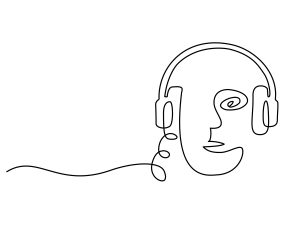Like the rest of the world, the podcast industry is currently obsessed with artificial intelligence. AI-driven start-ups are springing up like weeds, watered by millions in venture capital. Every day brings a new piece of AI software, three new AI-driven functions for every piece of software you’re already using, and five articles about all the AI software that is yet to come. Honestly, it’s to the point where it’s hard to talk about anything else. I was at a networking dinner last week where the topic was specifically banned, and so of course it was all we talked about all night.
It’s hard not to get swept up in all that enthusiasm for technology that promises so much, but I feel strongly that AI is a bubble, and it’s the kind of bubble that could not only pop, but explode, damaging everything that surrounds it. Artificial Intelligence can only actually do a small percentage of what its acolytes promise, and only a small percentage of that is done well. In the space between that promise and reality lies nothing less than an existential crisis for podcasting and all of digital media.
To begin to explain, let me share a thought about LinkedIn.
Over the last few years, automation on LinkedIn has grown into its own industry. Innumerable specialists will sell you services that seek out people you might want to connect with, write posts and messages for you, respond to the messages you receive, and like and share the posts of others. Obviously this is an attractive solution for people looking to market themselves over that platform but don’t have the bandwidth to be active on it.
Here’s the thing, though—the promise of social media has always been the connection of people at a distance. The hope of any LinkedIn marketing campaign is that an actual person with buying power will receive your message and spend their money with you. If it’s all automation—your bot writes a post that my bot likes and shares, so your bot writes a message that my bot responds to and so on and so forth—what’s the point? The proxy goal of likes and shares and messages on your LinkedIn account has completely supplanted the actual goal, which was a human connection that might lead to new business.
Haven’t we already crossed a line where the overflow of spam has made it nearly impossible for any cold in-app emails to actually be read? Surely, there must be a critical mass of automation—a point where so much of what happens of the platform is automated noise that the actual humans retreat completely and the whole thing collapses.
The same danger applies to podcasting.
The appeal of podcasting has always been human connection: voices you enjoy listening to telling you things you care to hear in a way that feels intimate and personal. Many have commented on the strong parasocial relationships people develop with podcast hosts they follow. That isn’t a side effect, it’s inherent to the strength of the medium. People think the draw of podcasting is the efficient transmission of information, but you could learn about a subject much more quickly by reading the Wikipedia page, and much more thoroughly by reading a book (or listening to one). No, we listen to podcasts because we like spending time with the people who make them. The information we learn is a way to justify that time.
A podcast “hosted” by an AI voice, therefore, has no real value. There is no connection. Even the best AI voices can get no further than the uncanny valley, where we know something is wrong and most are discomfited by it. This same danger exists in almost every use of AI automation in the creative process.
Computers are only good at what they are good at, which is to say that they are very fast and very stupid. As we’re learning from the disastrous rollout of AI in Google searches—anyone want a nice slice of glue pizza?—computers are extremely good at sorting through huge piles of data and looking for connections and extremely bad at knowing which of these connections are useful. As to which of these connections are engaging, inspiring, or beautiful, they have not a single clue. On a fundamental level, computers cannot write or draw or compose because they cannot tell the difference between good writing and bad, powerful art and hackery. The idea that these abilities are just a few software updates away is absolute fantasy. Despite the huge improvements in AI, the space between machine learning and human consciousness is still so wide that it may be infinite. “We’re halfway there” means nothing: half of infinity is infinity.
Can you produce a podcast by throwing a bunch of whatever into some AI software and hitting “go”? Sure you can. Will it make something that a large number of people would think is worth the time it takes to listen to it? No it will not, and overvaluing AI in your process will drive you further and further from audiences and success.
The potential effect on audiences of “digital cloning” or “deepfake” technology is even worse. When an AI learns to speak in the voice of a real human, all is well until the listener learns they were deceived. The curtain is pulled away and the human connection they thought they were feeling is shown to be a con job. This is not just trickery, but betrayal. This is bad enough in individual instances, but think of the disaster if audiences can no longer tell what is real and what is not—what is a human voice speaking to them and what is a simulacrum—across all the podcasts they like to listen to. What value does this medium have at that point? Why listen at all?
The medium of podcasting is at a moment of inflection. Roughly 20 years old, it is in the same position as film in the nineteen-teens and television in the nineteen-forties: leaving its infancy and entering adolescence, the age when it will really find itself. Will it come into its true power by finding all the ways to do what it does best—creating intimate connections between creators and audiences? Or will it throw that power away in the name of technological efficiency?
For those of us who work in the medium, the choices are ours. I really hope we make the right ones.
(David Hoffman is the Founder & Principal of CitizenRacecar





